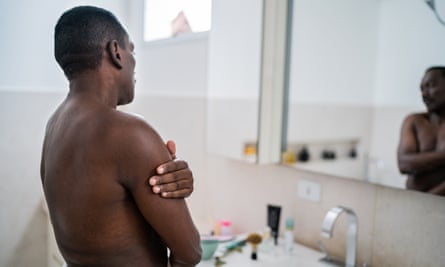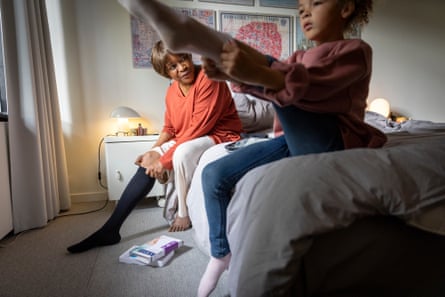[ad_1]
I was diagnosed with lymphedema in 2016 at the age of 34, a rare side effect of inflammatory arthritis that causes joint swelling, stiffness, skin redness and pain. I was already struggling with arm and hand movement from arthritis when, one day, I noticed my left arm was noticeably bigger than my right arm. I sought medical help, worried that this wasn’t just excess fluid under my skin but something more serious. Thankfully, an examination and tests ruled out anything sinister, but I wasn’t aware of how much of an impact lymphedema would have on my life.
I naively thought the swelling in my arm and discomfort was temporary or that treatment would be simple, but I was wrong. I’d been given very little information about the condition, so I made an appointment with my GP to determine the next steps. When I was told that lymphedema could not be cured, only treated, I was in shock. The damage to my lymphatic system, which removes excess fluid from the body, was permanent and could get worse, possibly affecting other body parts in the future.
The GP explained that a multifaceted approach was needed to manage the symptoms, using techniques to minimise fluid buildup and stimulate fluid flow through my body. These include wearing compression garments (JOBST has a wide range), taking good care of my skin, regular exercise, a healthy diet, and specialised massage techniques. That seemed like a lot of fuss for a swollen arm, but it was getting to the stage where I couldn’t get comfortable in bed or raise my left arm to wash my hair, so I was willing to try anything.

I ordered compression sleeves for my arm to help move the fluid away from the area. I was self-conscious about my larger arm and didn’t let anyone see me without long-sleeved tops, even in warmer weather. I tried exercising, but getting undressed at the gym filled me with dread, and my range of movement hampered many workouts.
I wish people could understand that while my lymphedema isn’t life threatening, it can be life limiting. I started feeling depressed, especially when I woke up one day to find my feet had swollen significantly. I cried, wondering how many other body parts would become affected. The skin in the areas affected by lymphedema was hard and tight. I was convinced that one day the skin would pop open. I followed advice to moisturise regularly and gave up my beloved baths, as hot water increased the swelling.
I’ve had some tactless comments when I’ve shown people my lymphedema affected areas, and they’ve asked if I’m contagious or whether I’m sure that I’ve not just had too much salty food and it’ll just go away if I drink more water. I want to shake people and say: “It’s a chronic illness, not water retention!” There’s a real lack of common knowledge about the condition and, honestly, if I wasn’t affected by it, I’d probably be clueless too.

I read online that cold water swimming can be helpful for some, and living next to the North Sea, I was guaranteed cold water for most of the year. So I borrowed a wetsuit, joined a local group of swimmers, and found myself happily bobbing around in the cold water for longer than expected. The water temperature was soothing, and I felt completely supported in the water and by the community of women I met. One had lymphedema due to breast cancer surgery, and we bonded over our shared experience. The more I got to know everyone, the more comfortable I became with undressing after the swim. No one stared or commented. The judgment of my body was all in my head.
I realised I needed to find a community for my lymphedema, so I joined forums where those with the condition share their experiences and tips for coping. Many of these forums are often found on cancer-specific sites, but there are places such as LymphConnect, a platform created by Essity – a global hygiene and health company with leading period and intimate care brands such as Bodyform and Modibodi, incontinence brand TENA and compression therapy brand JOBST – under its JOBST brand, that are for all lymphedema sufferers. Now that I’m a little further on in my journey, I find myself chatting to newly diagnosed people about my own experience.
While I can now manage my condition, it still affects my self-esteem, and I’m often frustrated that there’s no quick fix. Managing lymphedema takes trial and error, patience and hard work. Everyone is different, and what works for me might not work for you, but the most important thing I’ve discovered is the power of community and finding your people. Lymphedema can be an isolating experience, but you don’t have to go through it alone.

Essity’s film, Studio Taboo, spoke to a number of people with a variety of health issues that are still deemed taboo, many of which are invisible. The above clip features Sofia explaining how lymphedema affects her.
For lymphedema community and support, visit LymphConnect. And for the ease of day-to-day symptoms, JOBST has a range of compression garments
[ad_2]
Source link
